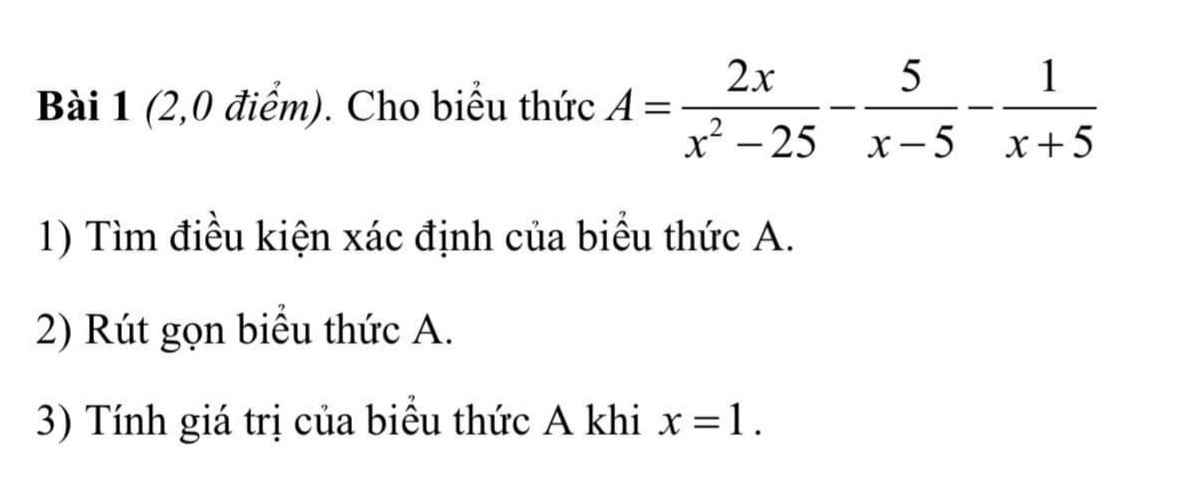Cho biểu thức A = x - √x / 2 - √x a ) tính giá trị biểu thức A khi | x - 5 | = 4
Hãy nhập câu hỏi của bạn vào đây, nếu là tài khoản VIP, bạn sẽ được ưu tiên trả lời.


a: \(A=\dfrac{x^2-2x+2x^2+4x-3x^2-4}{\left(x-2\right)\left(x+2\right)}=\dfrac{2x-4}{\left(x-2\right)\left(x+2\right)}=\dfrac{2}{x+2}\)
a, \(\dfrac{x}{x+2}\) + \(\dfrac{2x}{x-2}\) -\(\dfrac{3x^2-4}{x^2-4}\)
= \(\dfrac{x}{x+2}+\dfrac{2x}{x-2}-\dfrac{3x^2+4}{x^2-4}\)
= \(\dfrac{x}{x+2}+\dfrac{2x}{x-2}-\dfrac{3x^2+4}{\left(x+2\right)\left(x-2\right)}\)
= \(\dfrac{x\left(x-2\right)+2x\left(x+2\right)-3x^2-4}{\left(x+2\right)\left(x-2\right)}\)
= \(\dfrac{2x-4}{\left(x+2\right)\left(x-2\right)}=\dfrac{2\left(x-2\right)}{\left(x+2\right)\left(x-2\right)}=\dfrac{2}{x+2}\)
Có vài bước mình làm tắc á nha :>

a) A = (x - 5)(x² + 5x + 25) - (x - 2)(x + 2) + x(x² + x + 4)
= x³ - 125 - x² + 4 + x³ + x² + 4x
= (x³ + x³) + (-x² + x²) + 4x + (-125 + 4)
= 2x³ + 4x - 121
b) Tại x = -2 ta có:
A = 2.(-2)³ + 4.(-2) - 121
= 2.(-8) - 8 - 121
= -16 - 129
= -145
c) x² - 1 = 0
x² = 1
x = -1; x = 1
*) Tại x = -1 ta có:
A = 2.(-1)³ + 4.(-1) - 121
= 2.(-1) - 4 - 121
= -2 - 125
= -127
*) Tại x = 1 ta có:
A = 2.1³ + 4.1 - 121
= 2.1 + 4 - 121
= 2 - 117
= -115

Bài 5:
a: Thay \(x=4+2\sqrt{3}\) vào E, ta được:
\(E=\dfrac{\sqrt{3}+1-1}{\sqrt{3}+1-3}=\dfrac{\sqrt{3}}{\sqrt{3}-2}=-3-2\sqrt{3}\)
b: Để E<1 thì E-1<0
\(\Leftrightarrow\dfrac{\sqrt{x}-1-\sqrt{x}+3}{\sqrt{x}-3}< 0\)
\(\Leftrightarrow\sqrt{x}-3< 0\)
hay x<9
Kết hợp ĐKXĐ, ta được: \(\left\{{}\begin{matrix}0\le x< 9\\x\ne1\end{matrix}\right.\)
c: Để E nguyên thì \(4⋮\sqrt{x}-3\)
\(\Leftrightarrow\sqrt{x}-3\in\left\{-2;1;2;4\right\}\)
\(\Leftrightarrow\sqrt{x}\in\left\{4;5;7\right\}\)
hay \(x\in\left\{16;25;49\right\}\)
Câu 2:
a) Ta có \(x=4-2\sqrt{3}\Rightarrow\sqrt{x}=\sqrt{\left(\sqrt{3}-2\right)^2}=\sqrt{3}-2\)
Thay \(x=\sqrt{3}-1\) vào \(B\), ta được
\(B=\dfrac{\sqrt{3}-1-2}{\sqrt{3}-1+1}=\dfrac{\sqrt{3}-3}{\sqrt{3}}=1-\sqrt{3}\)
b) Để \(B\) âm thì \(\dfrac{\sqrt{x}-2}{\sqrt{x}+1}< 0\) mà \(\sqrt{x}+1\ge1>0\forall x\) \(\Rightarrow\sqrt{x}-2< 0\Rightarrow\sqrt{x}< 2\Rightarrow x< 4\)
c) Ta có \(B=\dfrac{\sqrt{x}-2}{\sqrt{x}+1}=1-\dfrac{3}{\sqrt{x}+1}\)
Với mọi \(x\ge0\) thì \(\sqrt{x}\ge0\Rightarrow\sqrt{x}+1\ge1\Rightarrow\dfrac{3}{\sqrt{x}+1}\le3\Rightarrow B=1-\dfrac{3}{\sqrt{x}+1}\ge-2\)
Dấu "=" xảy ra khi \(\sqrt{x}+1=1\Leftrightarrow x=0\)
Vậy \(B_{min}=-2\) khi \(x=0\)

đkxđ:\(x\ne5,x\ne-5\)
\(\dfrac{2x}{\left(x-5\right)\left(x+5\right)}-\dfrac{5}{x-5}-\dfrac{1}{x+5}\)
\(\dfrac{2x}{\left(x-5\right)\left(x+5\right)}-\dfrac{5x+25}{\left(x-5\right)\left(x+5\right)}-\dfrac{x-5}{\left(x-5\right)\left(x+5\right)}\)
\(\dfrac{2x-5x-25-x+5}{\left(x-5\right)\left(x+5\right)}=\dfrac{-4x-20}{\left(x-5\right)\left(x+5\right)}=\dfrac{-4\left(x+5\right)}{\left(x-5\right)\left(x+5\right)}=-\dfrac{4}{x-5}\)
thay x=1 vào bt A, ta được:
\(-\dfrac{4}{1-5}=1\)

a: \(A=\left(\dfrac{x}{x^2-4}+\dfrac{4}{x-2}+\dfrac{1}{x+2}\right):\dfrac{3x+3}{x^2+2x}\)
\(=\dfrac{x+4x+8+x-2}{\left(x-2\right)\left(x+2\right)}\cdot\dfrac{x\left(x+2\right)}{3\left(x+1\right)}\)
\(=\dfrac{6\left(x+1\right)\cdot x\left(x+2\right)}{3\left(x+1\right)\left(x-2\right)\left(x+2\right)}\)
\(=\dfrac{2x}{x-2}\)

a: ĐKXĐ: x>=0; x<>1
b \(A=\left(\dfrac{2\sqrt{x}+x}{x\sqrt{x}-1}-\dfrac{1}{\sqrt{x}-1}\right):\dfrac{\sqrt{x}+2}{x+\sqrt{x}+1}\)
\(=\dfrac{x+2\sqrt{x}-x-\sqrt{x}-1}{x\sqrt{x}-1}\cdot\dfrac{x+\sqrt{x}+1}{\sqrt{x}+2}\)
\(=\dfrac{1}{\sqrt{x}+2}\)
c: Khi x=9-4 căn 5 thì \(A=\dfrac{1}{\sqrt{5}-2+2}=\dfrac{\sqrt{5}}{5}\)
d: căn x+2>=2
=>A<=1/2
Dấu = xảy ra khi x=0

1. ĐKXĐ: \(x\ne\pm1\)
2. \(A=\left(\dfrac{x+1}{x-1}-\dfrac{x+3}{x+1}\right)\cdot\dfrac{x+1}{2}\)
\(=\dfrac{\left(x+1\right)^2-\left(x-3\right)\left(x-1\right)}{\left(x-1\right)\left(x+1\right)}\cdot\dfrac{x+1}{2}\)
\(=\dfrac{x^2+2x+1-x^2+4x-3}{\left(x-1\right)\left(x+1\right)}\cdot\dfrac{x+1}{2}\)
\(=\dfrac{6x-2}{\left(x-1\right)\left(x+1\right)}\cdot\dfrac{x+1}{2}\)
\(=\dfrac{2\left(x-3\right)\left(x+1\right)}{2\left(x-1\right)\left(x+1\right)}\)
\(=\dfrac{x-3}{x-1}\)
3. Tại x = 5, A có giá trị là:
\(\dfrac{5-3}{5-1}=\dfrac{1}{2}\)
4. \(A=\dfrac{x-3}{x-1}\) \(=\dfrac{x-1-3}{x-1}=1-\dfrac{3}{x-1}\)
Để A nguyên => \(3⋮\left(x-1\right)\) hay \(\left(x-1\right)\inƯ\left(3\right)=\left\{1;-1;3;-3\right\}\)
\(\Rightarrow\left\{{}\begin{matrix}x-1=1\\x-1=-1\\x-1=3\\x-1=-3\end{matrix}\right.\Rightarrow\left\{{}\begin{matrix}x=2\left(tmđk\right)\\x=0\left(tmđk\right)\\x=4\left(tmđk\right)\\x=-2\left(tmđk\right)\end{matrix}\right.\)
Vậy: A nguyên khi \(x=\left\{2;0;4;-2\right\}\)

